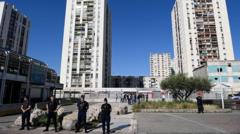Authorities in Nîmes, located in southern France, have announced a new night-time curfew for individuals under the age of 16, as a response to a recent surge in violent incidents associated with drug trafficking. This measure is intended to prevent the youth from being "exposed to violence" and to help contain rising tensions in the area, as confirmed by local officials.
In the past month, multiple shootings have plagued Nîmes, tragically resulting in the death of one individual and leaving several others injured. The discovery of a partially burned body of a 19-year-old on the outskirts of the city last week further underscored the alarming trend of violence. Mayor Jean-Paul Fournier labeled the situation as "untenable," attributing the chaos to drug traffickers who have created an atmosphere of "fear and terror."
The enforced curfew, from 21:00 to 06:00, has garnered support from deputy mayor Richard Schieven, who expressed confidence that it would not only protect those minors uninvolved in drug activities but also those as young as 12 or 13 who are often exploited by traffickers.
The nearby city of Béziers has already had a curfew for children under 13 since last year, and it was expanded to include those under 15 in specific areas earlier this year. Mayor Robert Ménard noted the necessity of the curfew by stating that "No 10-year-old out on the street at 02:00 is up to anything but mischief."
Despite these measures, violence continues to surge in Béziers, where recent incidents of youth attacking police with fireworks have been reported. Similarly, Limoges, also in southwestern France, has seen curfew measures established for those under 13. However, Mayor Émile Roger Lombertie lamented that the implementation of curfews has yielded disappointing results, as disturbances persist without police interception.
Two years ago, a tragic incident involving the death of a 10-year-old boy in Nîmes highlighted the gravity of drug-related violence, revealing a worrying trend of increasing violence that has since spread beyond the traditional drug conflict hotspot of Marseille.
Official statistics from the interior ministry indicate that 110 people have died, and over 300 have been injured due to drug-related violence in France this year alone. In response, Justice Minister Gérard Darmanin and Interior Minister Bruno Retailleau have been vocal about combating the drug trade's fallout. Earlier this year, they successfully passed a bill that facilitates the construction of two maximum-security prisons for drug lords, the establishment of a specialized prosecutor’s office, and enhanced powers for law enforcement.
Darmanin confirmed that high-risk drug traffickers have already begun to be transferred to these newly established high-security facilities. This crackdown follows a wave of violence in French prisons that authorities attribute to drug gangs retaliating against government enforcement actions.
In the past month, multiple shootings have plagued Nîmes, tragically resulting in the death of one individual and leaving several others injured. The discovery of a partially burned body of a 19-year-old on the outskirts of the city last week further underscored the alarming trend of violence. Mayor Jean-Paul Fournier labeled the situation as "untenable," attributing the chaos to drug traffickers who have created an atmosphere of "fear and terror."
The enforced curfew, from 21:00 to 06:00, has garnered support from deputy mayor Richard Schieven, who expressed confidence that it would not only protect those minors uninvolved in drug activities but also those as young as 12 or 13 who are often exploited by traffickers.
The nearby city of Béziers has already had a curfew for children under 13 since last year, and it was expanded to include those under 15 in specific areas earlier this year. Mayor Robert Ménard noted the necessity of the curfew by stating that "No 10-year-old out on the street at 02:00 is up to anything but mischief."
Despite these measures, violence continues to surge in Béziers, where recent incidents of youth attacking police with fireworks have been reported. Similarly, Limoges, also in southwestern France, has seen curfew measures established for those under 13. However, Mayor Émile Roger Lombertie lamented that the implementation of curfews has yielded disappointing results, as disturbances persist without police interception.
Two years ago, a tragic incident involving the death of a 10-year-old boy in Nîmes highlighted the gravity of drug-related violence, revealing a worrying trend of increasing violence that has since spread beyond the traditional drug conflict hotspot of Marseille.
Official statistics from the interior ministry indicate that 110 people have died, and over 300 have been injured due to drug-related violence in France this year alone. In response, Justice Minister Gérard Darmanin and Interior Minister Bruno Retailleau have been vocal about combating the drug trade's fallout. Earlier this year, they successfully passed a bill that facilitates the construction of two maximum-security prisons for drug lords, the establishment of a specialized prosecutor’s office, and enhanced powers for law enforcement.
Darmanin confirmed that high-risk drug traffickers have already begun to be transferred to these newly established high-security facilities. This crackdown follows a wave of violence in French prisons that authorities attribute to drug gangs retaliating against government enforcement actions.




















